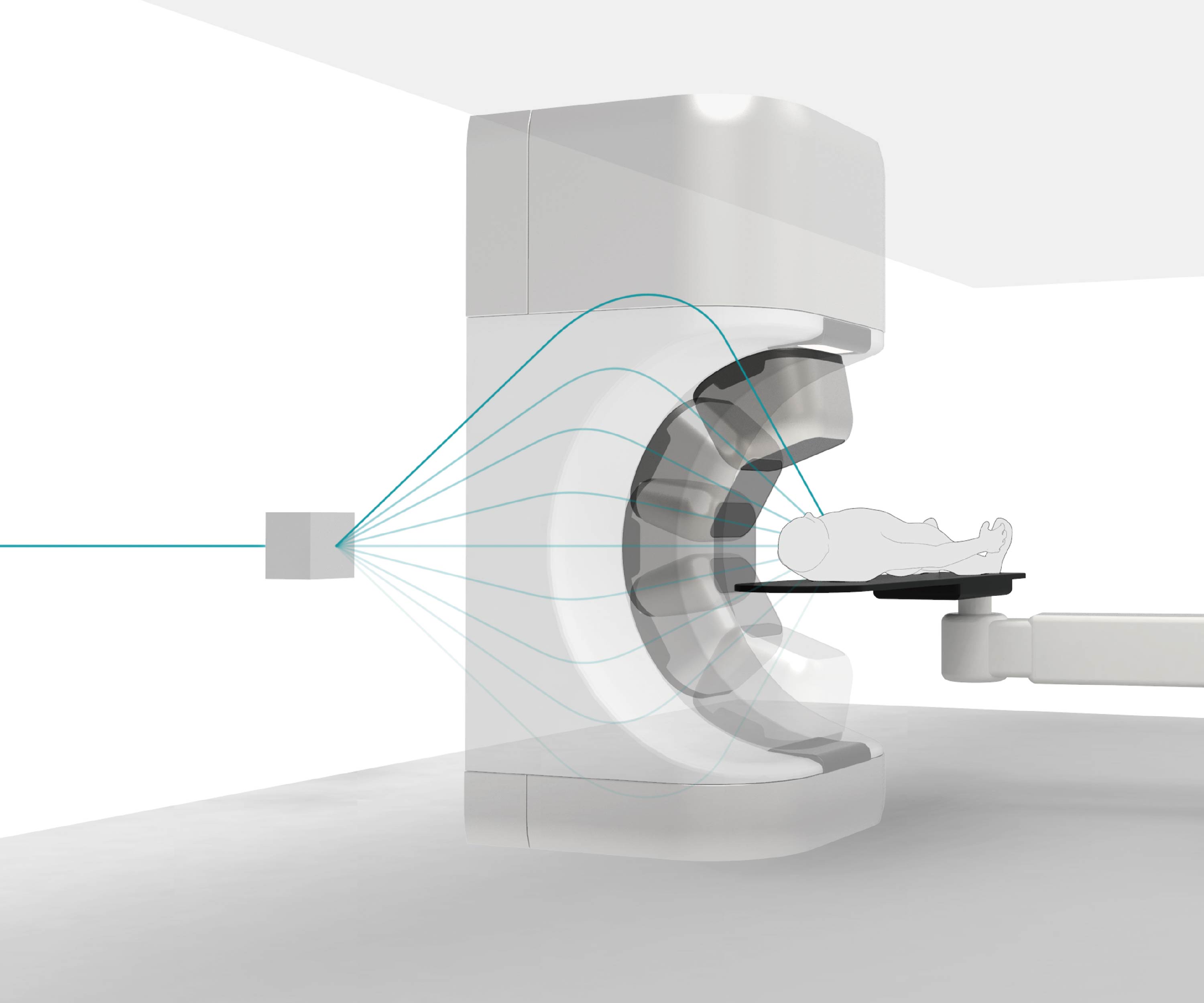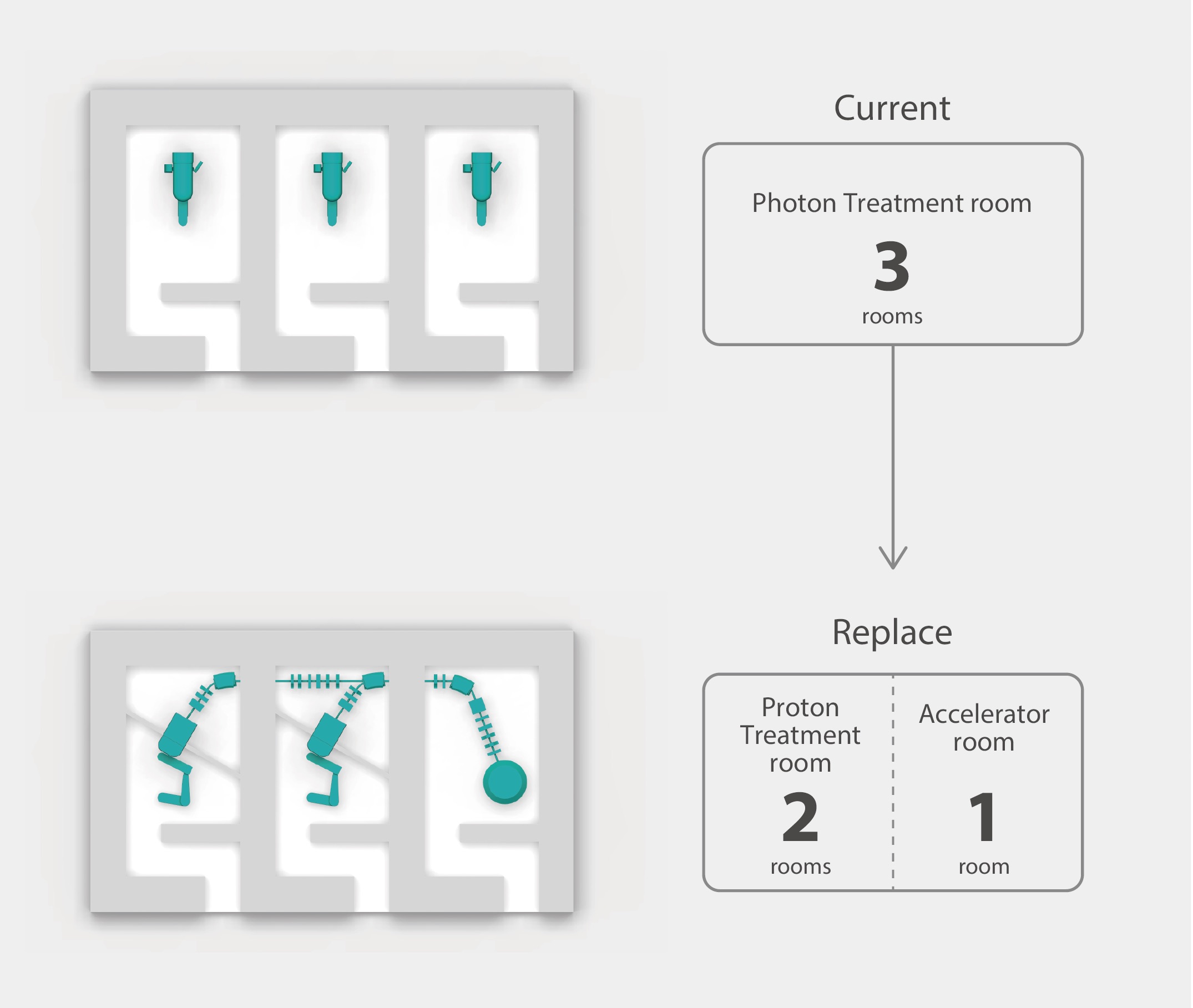Business overview
Proton in your clinic
Development of ultra-compact
proton cancer therapy system
B dot Medical Inc. is developing an ultra-compact proton cancer therapy system.
The ideal cancer treatment
Proton therapy is a pioneering technology that it thought to be able to treat cancers that is otherwise considered intractable. In contrast to conventional x-ray cancer therapies, in proton therapy most of the irradiation in delivered to the tumor. This will decrease side/secondary effects in surrounding healthy tissues.
Bringing proton therapy closer
The number of patients who are treated with proton cancer therapy is expected to increase:
The use of proton cancer therapy became applicable for health insurance in Japan for pediatric cancer in 2016, followed by prostate cancer, head and neck cancer, bone and soft tissue tumors in 2018, and the number of patients that receive proton cancer therapy is expected to continue to increase.
Currently, proton cancer therapy systems are not widely in use:
Although patient numbers are expected to grow, there are not many hospitals that can newly implement proton cancer therapy systems. Proton cancer therapy systems are very large, often needing a dedicated building for installation, therefore making cost and time an issue for its implementation.
We will make proton cancer therapy more accessible:
We have decided to approach this issue by designing a proton cancer therapy system that is significantly compact compared to conventional systems, to a size that will not need a new building to house it in. The key to realizing this downsizing is the “non-rotating gantry” that can irradiate patients from any angle, without using a rotating mechanism. In a conventional proton beam therapy system, a very large rotating mechanism is necessary to physically rotate a huge magnet to bend the proton beam to irradiate patients from any desired angle. Our system does not require this large rotating mechanism. By using a superconducting magnet as the bending magnet and optimizing it, the proton beam bending can be compactly achieved. This has made significant downsizing of the proton therapy system possible.
The ultra-compact proton therapy system will help provide proton therapy treatment to more patients:
The new ultra-compact proton cancer therapy system will not only be easier to install in hospitals new to proton cancer therapy, but will be installable within the space of the commonly used x-ray cancer therapy system. We envision a future where proton cancer therapy is more common, and where patients have access to better treatment options.

By applying a non-rotating gantry that utilizes a super conducting magnet as a bending magnet, though small, the ultra-compact system can irradiate from any desired angle.

3 rooms x-ray cancer treatment rooms can be refurbished into 2 proton therapy treatment rooms. No major renovation will be necessary.
Consulting
Cunsulting support
for Particle therapy
A business model to maximize resources as a NIRS start-up.
Our business mainly focus on the commissioned projects undertaken by our highly specialized engineers with expertise and experience in both development and operation of particle radiotherapy systems.
For medical device manufacturer
We have strong engineering skills acquired through extensive operational performance at NIRS, as well as advanced know-how on particle radiotherapy apparatus thorough our advanced research results. Though our experience and background we provide the following services/solutions.
Support for smooth system design and project progression, by comprehensive optimization of the whole system; a cost-effective system design is vital in setting up an effective particle radiotherapy treatment system.
Help minimize construction duration, and thus reduce resource burden.
Provide solutions from the perspective of the users, such as doctors and medical physicists.
For end users
We provide technical support for particle radiotherapy systems to match our customer’s needs. We provide for the end users, easily understandable technical support in all aspects of particle radiotherapy systems with references from actual examples experienced at NIRS.
For customers who are considering the implementation of a particle radiotherapy system:
First, we will conduct an interview to understand your needs in detail, such as the desired type of treatment and treatment frequency, as well as regarding budget and construction schedule. Taking into account of the provided information, we will suggest (particle radiotherapy system) implementation plans to match your specific situation. Furthermore, we provide consultation support in designing operational plans after the initial set up and introduction of the systems if necessary.
For customers who already have a running system:
For those customers who already have devices installed and in operation, our highly qualified engineers provide support in designing more efficient streamlined operation plans, to raise profitability, and provide advice about system upgrades.

